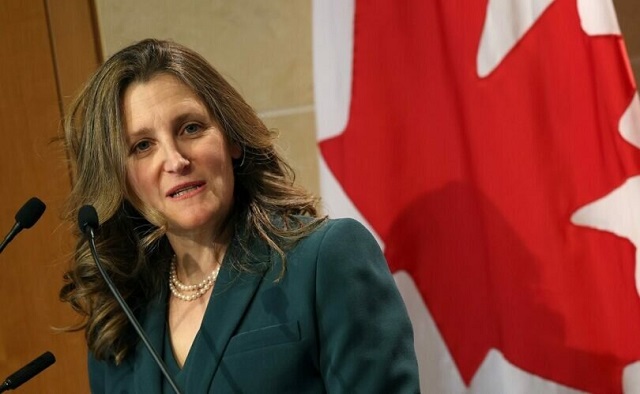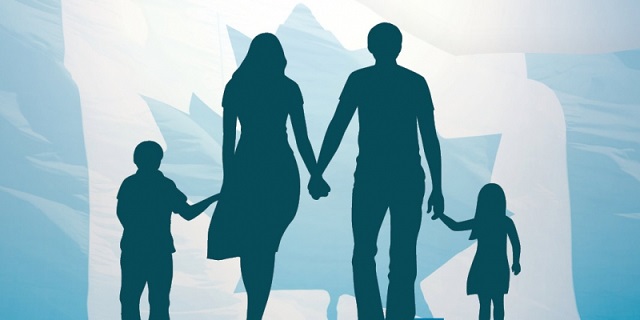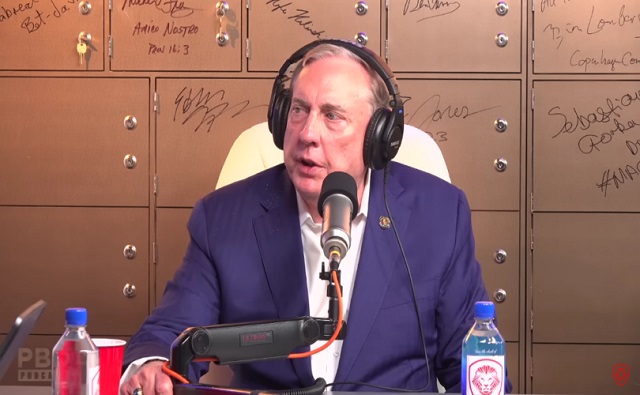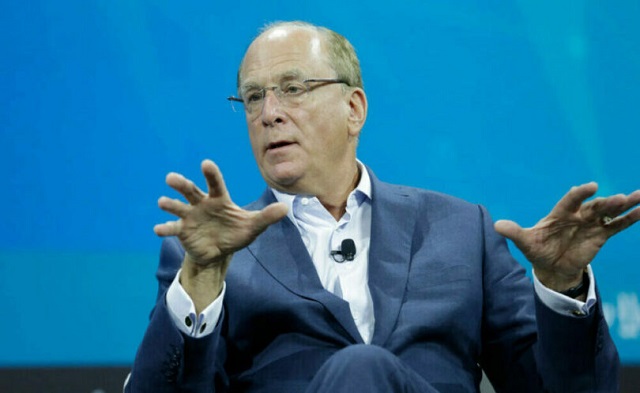Alberta
Province pumping millions into mental health supports for post-secondary students

Representatives from the Student Counseling Office and Mental Health at NAIT, Kids Help Phone, United Way and members of Alberta Students’ Executive Council stood with Associate Minister Luan and Minister Nicolaides
From the Province of Alberta
More mental health supports for students
Government is investing $22 million to deliver more mental health supports for post-secondary students.
Students at the 26 post-secondary institutions across Alberta will have more access to mental health and addiction crisis supports through text and chat, and professional counselling by phone. Those services will be supported by a new digital navigation and crisis hub that will link service providers, including United Way’s 211 service, helplines such as Kids Help Phone, HealthLink/811 and other distress lines.
“Our government is committed to eliminating barriers to mental health and addiction services for post-secondary students. Working together, we’ll make it easier for students to talk openly about mental health and ensure they have access to supports when they need them.”
In addition, Budget 2019 continues to support a range of on-campus mental health services, including:
- increased access to counsellors
- early alert systems
- peer support programs
- awareness campaigns and mental health literacy
- training for faculty, staff and students in suicide-prevention
- helping others in distress
- personal coping strategies
“One of the common themes I have heard from our students, from Day 1, is the need to strengthen mental health supports on campus. This initiative will improve access to mental health services and will make sure our students can find help when they need it. I am always listening to students, and this announcement demonstrates their advocacy pays off.”
On-campus services are supported by the Post-secondary Mental Health Grant of $7.6 million this year.
In addition, government is funding expansion of digital services by providing $6.75 million to Kids Help Phone to expand its 24-7, free, confidential and professional online and telephone counselling and volunteer-led text-based crisis support. Another $7.5 million will fund a new digital navigation and crisis hub that will link United Way’s 211 service to other helplines such as Kids Help Phone, HealthLink/811 and other distress lines.
“Kids Help Phone is pleased to be a part of this initiative that will help Albertans, particularly post-secondary students, connect to the services they need in a timely fashion. Navigating the mental health system is complex and we are proud to work with partners to ensure all Albertans get the help they need, when they need it most.”
“More than 500,000 Albertans access at least one mental health service each year, with many others unable to get help when they need it. With this partnership, Albertans will have access to information and help at any time no matter where they live in the province, allowing anyone to connect when they need to most.”
“Mental health is critical to the success and well-being of everyone. In order to thrive inside the classroom and beyond, mental health needs to be supported.”
Alberta
Red Deer Doctor critical of Alberta’s COVID response to submit report to Danielle Smith this May

From LifeSiteNews
Leading the task force is Dr. Gary Davidson, who was skeptical of mandates at the time.
Alberta Premier Danielle Smith will soon be receiving a little-known report she commissioned which tasked an Alberta doctor who was critical of the previous administration’s handling of COVID to look into how accurate the province’s COVID data collection was, as well as the previous administration’s decision-making process and effectiveness.
As noted in a recent Globe and Mail report, records it obtained show that just less than one month after becoming Premier of Alberta in November of 2022, Smith tasked then-health minister Jason Copping to create the COVID data task force.
Documents show that the Alberta government under Smith gave the new task force, led by Dr. Gary Davidson – who used to work as an emergency doctor in Red Deer, Alberta – a sweeping mandate to look at whether the “right data” was obtained during COVID as well as to assess the “integrity, validity, reliability and quality of the data/information used to inform pandemic decisions” by members of Alberta Health Services (AHS).
As reported by LifeSiteNews in 2021, Davidson said during the height of COVID that the hospital capacity crisis in his province was “created,” was not a new phenomenon, and had nothing to do with COVID.
“We have a crisis, and we have a crisis because we have no staff, because our staff quit, because they’re burned out, they’re not burnt out from COVID,” Davidson said at the time.
Davidson also claimed that the previous United Conservative Party government under former Premier Jason Kenney had been manipulating COVID statistics.
In comments sent to the media, Smith said that in her view it was a good idea to have a “contrarian perspective” with Davidson looking at “everything that happened with some fresh eyes.”
“I needed somebody who was going to look at everything that happened with some fresh eyes and maybe with a little bit of a contrarian perspective because we’ve only ever been given one perspective,” she told reporters Tuesday.
“I left it to [Davidson] to assemble the panel with the guidance that I would like to have a broad range of perspectives.”
Smith took over from Kenney as leader of the UCP on October 11, 2022, after winning the leadership of the party. The UCP then won a general election in May 2023. Kenney was ousted due to low approval ratings and for reneging on promises not to lock Alberta down during COVID.
After assuming her role as premier, Smith promptly fired the province’s top doctor, Deena Hinshaw, and the entire AHS board of directors, all of whom oversaw the implementation of COVID mandates.
Under Kenney, thousands of nurses, doctors, and other healthcare and government workers lost their jobs for choosing to not get the jabs, leading Smith to say – only minutes after being sworn in – that over the past year the “unvaccinated” were the “most discriminated against” group of people in her lifetime.
As for AHS, it still is promoting the COVID shots, for babies as young as six months old, as recently reported by LifeSiteNews.
Task force made up of doctors both for and against COVID mandates
In addition to COVID skeptic Dr. Gary Davidson, the rather secretive COVID task force includes other health professionals who were critical of COVID mandates and health restrictions, including vaccine mandates.
The task force was given about $2 million to conduct its review, according to The Globe and Mail, and is completely separate from another task force headed by former Canadian MP Preston Manning, who led the Reform Party for years before it merged with another party to form the modern-day Conservative Party of Canada.
Manning’s task force, known as the Public Health Emergencies Governance Review Panel (PHEGRP), released its findings last year. It recommend that many pro-freedom policies be implemented, such as strengthening personal medical freedoms via legislation so that one does not lose their job for refusing a vaccine, as well as concluding that Albertans’ rights were indeed infringed upon.
The Smith government task force is run through the Health Quality Council of Alberta (HQCA) which is a provincial agency involved in healthcare research.
Last March, Davidson was given a project description and terms of reference and was told to have a final report delivered to Alberta’s Health Minister by December of 2023.
As of now, the task force’s final report won’t be available until May, as per Andrea Smith, press secretary to Health Minister Adriana LaGrange, who noted that the goal of the task force is to look at Alberta’s COVID response compared to other provinces.
According to the Globe and Mail report, another person working on the task force is anesthetist Blaine Achen, who was part of a group of doctors that legally challenged AHS’s now-rescinded mandatory COVID jab policy for workers.
Some doctors on the task force, whom the Globe and Mail noted held “more conventional views regarding the pandemic,” left it only after a few meetings.
In a seeming attempt to prevent another draconian crackdown on civil liberties, the UCP government under Smith has already taken concrete action.
The Smith government late last year passed a new law, Bill 6, or the Public Health Amendment Act, that holds politicians accountable in times of a health crisis by putting sole decision-making on them for health matters instead of unelected medical officers.
Alberta
Alberta’s baby name superstar steals the show again

Olivia and Noah continue to reign as top baby names in 2023.

Olivia and Noah are once again topping the lists in Alberta, highlighting the enduring appeal of the names. Olivia maintains a record setting streak as the most popular girls name in Alberta for the 11th year in a row, while Noah remains top pick for boys’ names for a fifth consecutive year.
“Congratulations to those who welcomed a new addition to their family in 2023. Bringing a child into the world is a truly momentous occasion. Whether the name you chose was in the top 10 or one of a kind, these names are only the beginning of the endless possibilities that lie ahead for each child. I look forward to supporting this generation by ensuring Alberta remains a place where they can thrive.”
In choosing names for their new arrivals, parents appear to have found inspiration in a variety of places. Some parents may have been inspired by plants like Ivy, Rose, Juniper, Poppy, Azalea or in nature like Wren, River, Meadow and Flora.
Others may have taken a literary approach with names like Bennett, Sawyer, Juliet and Atticus or been inspired by notable names from religious texts like Eve, Noah, Mohammed and Gabriel.
As always, popular culture may have had an influence through famous musicians (Aretha, Lennon, Presley, Hendrix), athletes (Beckham, Crosby, Evander), and even fairytale princesses (Tiana, Jasmine, Aurora, Ariel, Belle).
Quick facts
- A total of 47,263 births were registered in Alberta in 2023
- Notable changes to the early 2020s lists:
- Evelyn rose to seventh place on the girls’ names list after tying for 19th place in 2022.
- Emily returned to the top 10 list for girls after taking a short break in 2021 and 2022 after a 10-year stretch in the top 10 that started in 2010.
- Violet has cracked the top 10 list for the first time in at least four decades, tying with Ava and Emily in ninth place.
- The top 10 boys’ names remain the same as last year but with a slight change in order.
- Historically, girls’ names that held the No. 1 spot for the longest consecutive time period include:
- Olivia: 11 years (2013-2023)
- Jessica: six years (1990-1995)
- Emily: five years (1998-2002)
- Historically, boys’ names that held the No. 1 spot for the longest consecutive time period include:
- Ethan: nine years (2001-2009)
- Liam: seven years (2010-2016)
- Matthew: five years (1995-1999)
- Noah: five years (2019-2023)
- Parents have up to one year to register their child’s birth. As a result, the list of 2023 baby names and birth statistics may change slightly.
Boys’ names and frequency – top 10 names 2018-23
(In brackets is the number of babies with each name)
| Place | Boy Names (2023) | Boy Names
(2022) |
Boy Names (2021) | Boy Names (2020) | Boy Names (2019) | Boy Names (2018) |
| 1 | Noah (276) | Noah (229) | Noah (274) | Noah (239) | Noah (275) | Liam (225) |
| 2 | Liam (181) | Liam (176) | Jack (220) | Oliver (229) | Liam (234) | Oliver (212) |
| 3 | Oliver (178) | Theodore (173) | Oliver (208) | Liam (206) | Oliver (225) | Noah (199) |
| 4 | Theodore (173) | Oliver (172) | Liam (198) | Benjamin (182) | Ethan (213) | Ethan (188) |
| 5 | Jack (153) | Jack (159) | Theodore (191) | William (178) | Jack (198) | Logan (182)
Lucas (182) |
| 6 | Henry (146) | William (146) | William (174) | Jack (169) | William (185) | Jacob (181) |
| 7 | Lucas (140) | Benjamin (138) | Ethan (162) | Lucas (163) | Lucas (174) | William (178) |
Girls’ names and frequency – top 10 names 2018-2023
(In brackets is the number of babies with each name)
| Place | Girl Names (2023) | Girl Names
(2022) |
Girl Names (2021) | Girl Names (2020) | Girl Names (2019) | Girl Names (2018) |
| 1 | Olivia (210) | Olivia (192) | Olivia (210) | Olivia (236) | Olivia (229) | Olivia (235) |
| 2 | Amelia (145) | Sophia (152) | Charlotte (166) | Emma (184) | Charlotte (188) | Emma (230) |
| 3 | Sophia
(138) |
Emma (149) | Ava (165) | Charlotte (161) | Sophia (181) | Charlotte (175) |
| 4 | Charlotte
(135) |
Amelia (133) | Emma (164) | Ava (159) | Emma (178) | Emily (164) |
| 5 | Emma (133) | Harper (125) | Amelia (161) | Sophia (151) | Ava (161) | Ava (161) |
| 6 | Isla (120) | Charlotte (117) | Sophia (137) | Amelia (145) | Amelia (159) | Abigail (153) |
| 7 | Evelyn (114) | Ava (115) | Isla (135) | Isla (133) | Emily (150) | Harper (150) |
| 8 | Chloe (101)
Violet (101) |
Isla (101) | Abigail (120)
Chloe (120) |
Emily (127) | Abigail (141) | Sophia (146) |
| 9 | Ava (99) Emily (99) |
Lily (100) | Evelyn (119) | Lily (123) | Hannah (137) | Amelia (145) |
| 10 | Hannah (98)
Hazel (98) |
Chloe (92) | Aria (112) | Abigail (114) | Elizabeth (124) | Elizabeth (130) |
Related information
-

 Housing2 days ago
Housing2 days agoTrudeau’s 2024 budget could drive out investment as housing bubble continues
-

 Censorship Industrial Complex2 days ago
Censorship Industrial Complex2 days agoDesperate Liberals move to stop MPs from calling Trudeau ‘corrupt’
-

 Alberta2 days ago
Alberta2 days agoAlberta government should create flat 8% personal and business income tax rate in Alberta
-

 Great Reset2 days ago
Great Reset2 days agoTerrorists Welcome: Chronic counterterrorism lapses at the border demand investigation
-

 Health23 hours ago
Health23 hours agoTransgender activists are threatening the author of scathing UK report on child ‘sex changes’
-

 National2 days ago
National2 days agoLow and middle income Canadians hit hardest by high marginal effective tax rates
-

 conflict2 days ago
conflict2 days agoCol. Douglas Macgregor: US is ‘facing disaster’ as it funds overseas wars while bankrupt
-

 Energy2 days ago
Energy2 days agoA Wealth-Creating Way of Reducing Global CO2 Emissions






